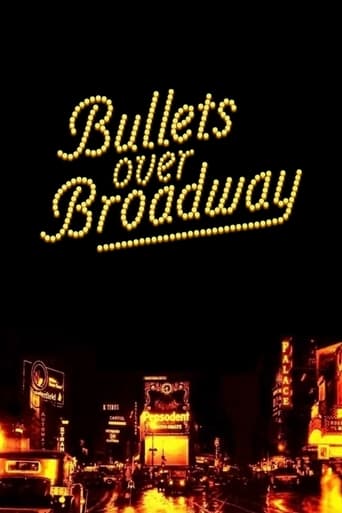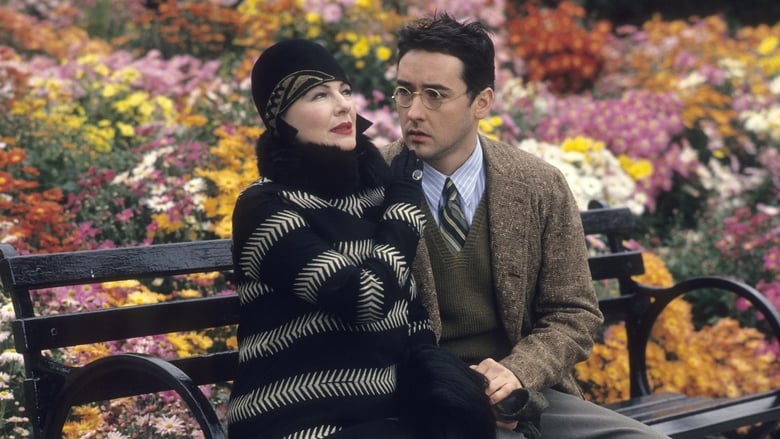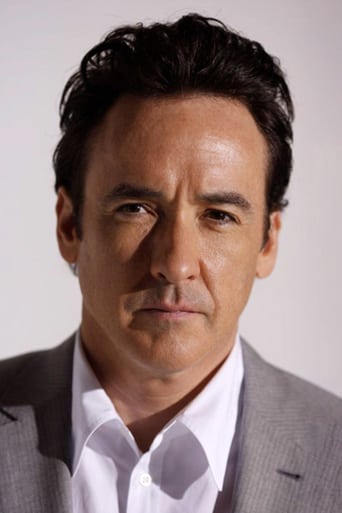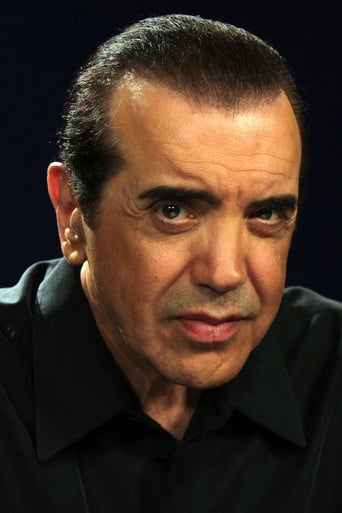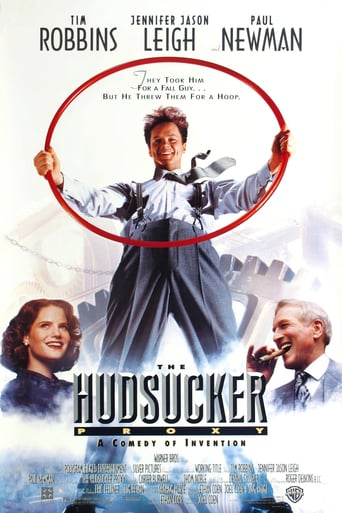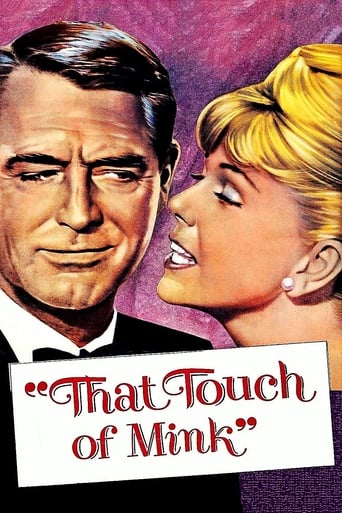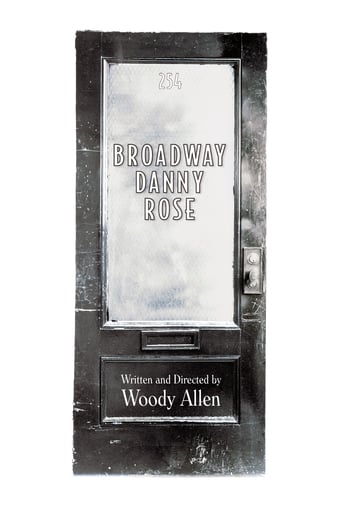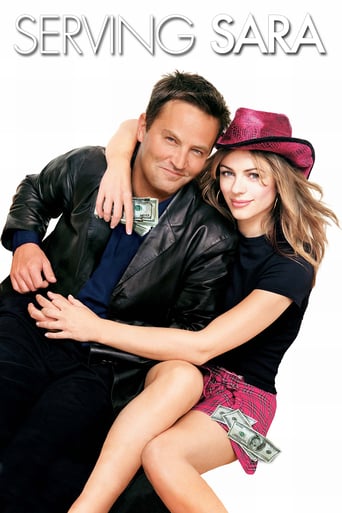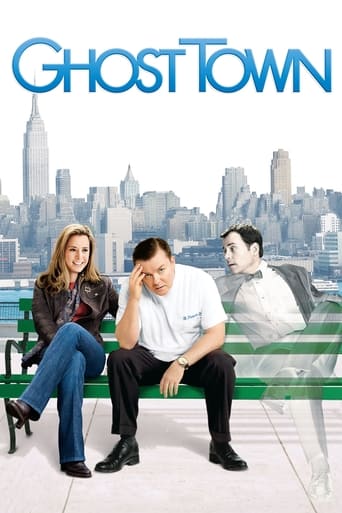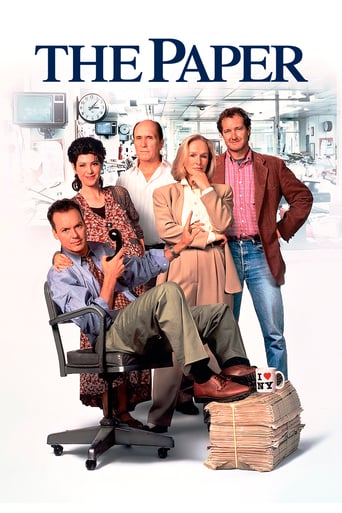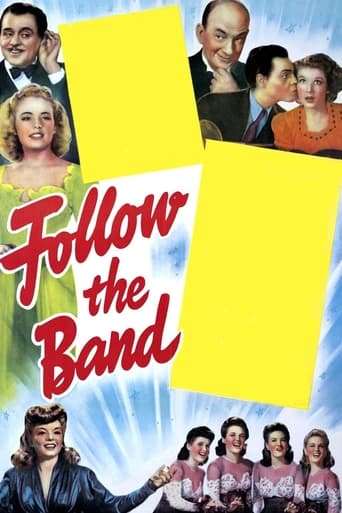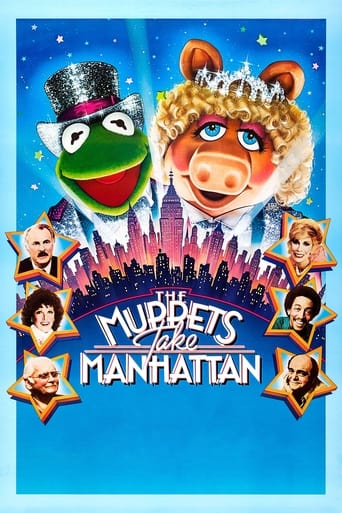Bullets Over Broadway (1994)
After young playwright, David Shayne obtains funding for his play from gangster Nick Valenti, Nick's girlfriend Olive miraculously lands the role of a psychiatrist—but not only is she a bimbo who could never pass for a psychiatrist—she's a dreadful actress. David puts up with the leading man who is a compulsive eater, the grand dame who wants her part jazzed up, and Olive's interfering hitman/bodyguard—but, eventually he must decide whether art or life is more important.
Watch Trailer
Cast


Similar titles
Reviews
Entertaining from beginning to end, it maintains the spirit of the franchise while establishing it's own seal with a fun cast
This story has more twists and turns than a second-rate soap opera.
This is a small, humorous movie in some ways, but it has a huge heart. What a nice experience.
This is one of the best movies I’ve seen in a very long time. You have to go and see this on the big screen.
Bullets over Broadway is a mockery of theatre folk and all their high minded aspirations of the world. There is no better target to being with than the young, idealistic screenwriter who has many a great idea. This man is David Shayne, who has just arrived in Broadway and has a screenplay that seeks to "transform men's soul". But it's a little heavy for other's tastes, and besides he has no backer. That is until a gangster agrees to finance his play as long as his girlfriends gets a lead role. Cusack plays the Allen type - it is written almost exactly as if Allen intended to play it himself. Listen to the inflection and intonation of his voice-over, so full of stuffed self-importance and faux gravitas. It channels the Allen type perfectly, who has always been supremely self-conscious. What keeps Shayne up at night? The horrible, moral wrong of selling out, so stressful that it stretches his ethical and artistic merit. Worse yet, the fact that he is only a mediocre writer is slowly being confirmed to him.But Cusack isn't Allen, so he can only go so far as to mimic. The character, like the Alvy Singers and the Isaac Davis' before him, is written to have the neurotic ability to make anything situation the worst thing in the world as well as simultaneously the funniest. He blows up about things that may matter, but does so in such an exasperated and offended way that it creates humour. Cusack channels this temporarily, when he defends accusations of an affair, and flips the tables around so that it is he who is the victim (later, he gets mightily offended that she has been doing the same thing). He is so self-righteous that it becomes her that is perpetuating the wrong by accusing him. The film is set up so that Shayne will have the same reaction when he discovers that Neal has been killed right before the play's opening night. Cusack merely explodes morally. Now imagine Allen in the same scene. He would have made a big fuss over the moral wrong of such a crime, but at the same time would also have trouble hiding the fact that he cares more about how his play is now ruined.The cause is the comedy being played too straight. The film's world is one of absurd exaggerations and pompous theatre folk that place reputation above all. It's funniest moments come from the irony that it is the low class, roughly-hewn gangster that is the most eloquent and complex. While all the others are fuming about their importance and trivialities, he is the one most passionate about the artistic merit. More so that Shayne himself, a fact which briefly rocks him and then comforts him as he goes on to take credit for all his ideas. Noble he is not. The rest of the cast is lovely, although they are merely pieces to build the joke. Wiest is the best of them, the airy inflator, still perpetuating the idea that she is as relevant and essential as she was in her prime. At a bar, she beats Cusack at his own game of self-righteousness by ordering two martinis for herself, and Shayne's answers illustrates just how self-centred they all are. She constantly shushes him with a "Don't speak!" every time he tries to wax lyrical, because it would ruin the idea of him. And if you had been paying attention to his dialogue, you would certainly agree.
In New York in 1928, a struggling playwright (John Cusack) is forced to cast a mobster's talentless girlfriend (Jennifer Tilly) in his latest drama in order to get it produced. The film received numerous Oscar nominations. Just in the acting category, we have: Academy Award for Best Supporting Actor – Chazz Palminteri. Academy Award for Best Supporting Actress – Jennifer Tilly. Academy Award for Best Supporting Actress – Dianne Wiest. Interestingly, Wiest won. Personally, I would have given the award to Tilly between the two of them.Although I love Woody Allen and I tend to enjoy mob stories (writing mob history is how I bay my bills), this somehow is not one of my favorite Woody tales. I think it is the lack of a real intellectual undercurrent. There is some talk of "the art and the artist" and even Nietzsche gets tossed around a bit, but this seems a bit light. Of course, when he is pumping out a movie a year for 50 years, I suppose not every one is going to be a philosophical gem.
Woody Allen scored another comedic bullseye with 1994's Bullets over Broadway, another delicious comic romp from the Woodmeister that takes the accustomed loopy characters that we are accustomed to from Woody and puts them in a more structured story and a period setting.Set in Manhattan during the 1920's, the film follows a playwright named David Shayne (John Cusack), who is having trouble getting his latest work on Broadway until his agent (Jack Warden) informs he has found a backer for the show, a dim-witted mafioso (Joe Vitrelli) who has agreed to finance the show as long as his girlfriend, Olive (Jennifer Tilly) gets a role in the show. Things get complicated when the don sends a bodyguard named Cheech (Chazz Palminteri) to keep an eye on Olive, but he ends up making life for our hero even more complicated when he starts making suggestions regarding the play and they make it better.This is another example of classic Woody, where Woody brings his own personality to the leading role and Cusack does an admirable job of channeling Woody (only Kenneth Branaugh did it better in Celebrity). Dianne Wiest won her second Oscar for Best Supporting Actress for her over-the-top, but totally hilarious turn as Helen Sinclair, a melodramatic Broadway diva who pretends to be in love with Shayne in order to improve her role in the play. Palminteri and Tilly both deliver star-making performances that earned them both Oscar nominations as well. Jim Broadbent has some very funny moments as a hammy actor in the play who has a problem with overeating and Tracy Ullmann is funny as another cast member who is driving Helen crazy with her dog.Woody's screenplay with Douglas McGrath provides all the fun twists and turns we expect from Woody and his sharp direction and flawless ear for music are also assets to a grandly entertaining comedy that Woody's fans will eat up.
I can not share the generally enthusiastic opinion of this film shown by most other IMDb database users. I am sorry about this as I want to like it - its main theme, contrasting the relative importance of love and art, both for Society and for most of its individual members, is significant for us all; and it is a very visually appealing presentation giving an excellent depiction of New York city as it was some 80 or more years ago, mainly in shades of brown that are never jarring to the eyes. I am not one of those who dislike Woody Allen's work .The Purple Rose of Cairo and Love and Death (where he showed he was able to combine farce with both fairly natural dialogue and his beloved philosophical discussions, this deserted him in BOB) are both treasured parts of my private movie collection. Although BOB is largely free of the artificial dialogue which spoils many of Woody's other films, it was spoilt by unrelenting and continuous overacting. Many films include at least one actor guilty of this heinous sin, but when they almost all do so the fault probably lies squarely with the Director. Here you could watch a few minutes culled from almost any point in the film and be confident of finding a shouting match, or characters waving their arms about like windmills.Many cinema fans do not like watching silent films because of the overacting they are said to feature. This is conventionally explained by the absence of dialogue forcing a greater emphasis on gesture, but John Barrymore even in some of his most unrestrained roles seldom continued exaggerated gesturing beyond the point when it was needed; and this need was often due more to difficulty in creating effective close ups than to the absence of sound, problems that co-existed in those early days. Today an actor can convey a world of meaning whilst quietly sitting at a table by, for example, just raising an eyebrow and uttering the word "Really" in an appropriately questioning tone. In silent days a one word caption "Really" would be almost as effective but the scene at the table, filmed from 5 or 10 metre away, would not do justice to the raised eyebrow in the same way as a modern close up, filmed from a distance of no more than a metre; so I can watch, for example, the 1925 version of Ben Hur more readily than I can Bullets over Broadway - improved technology has made us much less tolerant of artefacts that destroy the intended atmosphere. Fans of BOB claim the behaviour shown in this film is in fact typical of interactions between the types of character being portrayed, and the overacting is not as severe as I am suggesting. I doubt if this is true, but even if so the film itself makes it clear that this would be no excuse. The gangster's hit man Cheech in an early sequence explains carefully that it is no good presenting any dramatic work in a manner with which a viewer cannot empathise - depicted dialogue and behaviour must always be adapted to what would be expected and accepted by the potential audience. I do not live among people who shout and wave their arms about all the time, although I will of course accept such behaviour in a film where it is a natural response to a stressful situation; but if I do not live among people who behave like that, I am not likely to watch a film that shows everyone doing so continuously, for very long before I turn it off - or at the very least feel compelled to complain, as I am doing now.Bullets over Broadway is of course dangerously close to being a direct copy of the film Mistress, released a couple of years or so earlier, the stories are almost identical, except that the locale has been changed from Hollywood to New York and the film being produced has become a stage play. The same type of moral and artistic issues are brought out in both of them. Mistress was not so well enjoyed by IMDb users, but it is very interesting to compare the impact created by the two works. Whereas BOB plays more like a farce most of the time, Mistress provides biting satire which for me is both more enjoyable and far more effective. It was extremely well acted by almost all the cast, and Robert De Niro in particular gives a performance worthy of an Oscar nomination. No wonder the Hollywood elite did not like it, many of its barbs must have struck very close to home! Recently, after watching Bullets over Broadway I re-watched part of Mistress to decide whether my more favourable recollections of it were justified. I noted one short slanging match develop towards the end, this was quickly cut short by another character telling the perpetrator to calm down. Back to reality - this was all I really needed to see.. Mistress was real enough for me to feel like an outsider watching events happening, whereas BOB was definitely more like watching entertainers trying to keep me amused. For me the wrong film has been made available on DVD.

